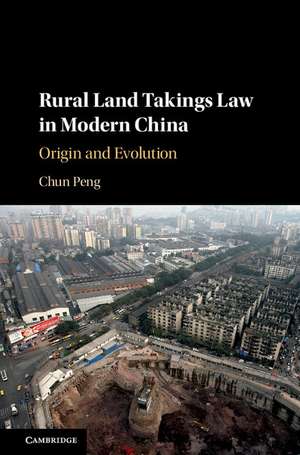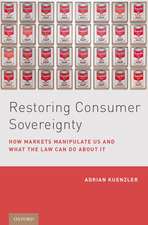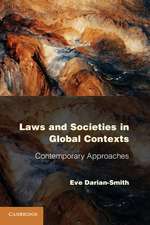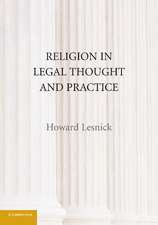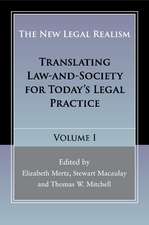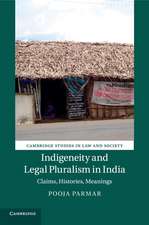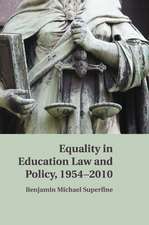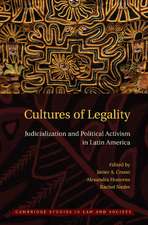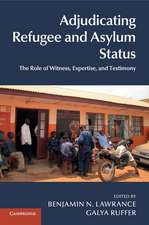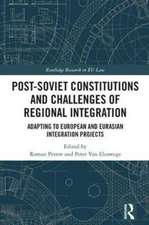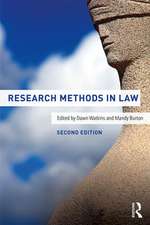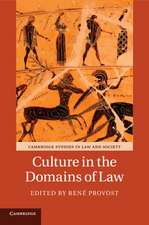Rural Land Takings Law in Modern China: Origin and Evolution
Autor Chun Pengen Limba Engleză Hardback – 18 apr 2018
| Toate formatele și edițiile | Preț | Express |
|---|---|---|
| Paperback (1) | 319.99 lei 6-8 săpt. | |
| Cambridge University Press – 7 aug 2019 | 319.99 lei 6-8 săpt. | |
| Hardback (1) | 754.55 lei 6-8 săpt. | |
| Cambridge University Press – 18 apr 2018 | 754.55 lei 6-8 săpt. |
Preț: 754.55 lei
Preț vechi: 877.39 lei
-14% Nou
Puncte Express: 1132
Preț estimativ în valută:
144.38€ • 150.75$ • 119.50£
144.38€ • 150.75$ • 119.50£
Carte tipărită la comandă
Livrare economică 04-18 aprilie
Preluare comenzi: 021 569.72.76
Specificații
ISBN-13: 9781107190931
ISBN-10: 1107190932
Pagini: 348
Ilustrații: 2 b/w illus. 7 tables
Dimensiuni: 157 x 235 x 20 mm
Greutate: 0.6 kg
Editura: Cambridge University Press
Colecția Cambridge University Press
Locul publicării:New York, United States
ISBN-10: 1107190932
Pagini: 348
Ilustrații: 2 b/w illus. 7 tables
Dimensiuni: 157 x 235 x 20 mm
Greutate: 0.6 kg
Editura: Cambridge University Press
Colecția Cambridge University Press
Locul publicării:New York, United States
Cuprins
1. Introduction; 2. A broken constitutional promise: diagnoses and prescriptions; 3. Limited reform: symptoms and causes; 4. Original constitutional takings clause: origin, meaning and purpose; 5. Theoretical foundations of land takings power: competing traditions and common legacy; 6. 1982 constitutional taking clause re-examined: new wine in an old bottle; 7. Rural land expropriation law in the reform era: a story of continuity; 8. Conclusion.
Recenzii
'Whether China's unprecedented economic growth and social development will lead its legal system to evolve towards Western systems is a question asked by virtually all observers of Chinese law. In this provocative book, Chun Peng argues persuasively that this is the wrong question, wrong because it is premised on the teleological assumption that Western models represent the sole legitimate destination for successful legal development. While a few Western observers – Donald Clark and Teemu Ruskola come to mind – have made the same point, Peng is the first to do so in depth, pointing out meticulously that the textual similarity of American and Chinese constitutional property law masks fundamental differences in origin, function, ideology, and political morality. In doing so, Peng reminds us all that every legal system, even or perhaps especially non-Western ones, must first be understood on its own before the inevitable comparative evaluations are made.' Frank Upham, Wilf Family Professor of Property Law, New York University School of Law
'China is a central case for understanding the role of law in development, but too rarely the focus of research in the field. This comprehensive study of rural takings law provides a window into China's developmental trajectory, while also speaking to broader theoretical debates. A lucid and tough analysis that deserves to be widely read.' Tom Ginsburg, Leo Spitz Professor of International Law and Professor of Political Science, University of Chicago
'This book greatly illuminates an important subject: the transformation of rural land use and land takings in modern China. As significantly, it provides an important corrective to those who wishfully misread China's legal reforms and rules to involve a transplanting of Western norms in China's legal soil. Professor Chun Peng, one of China's most promising young legal scholars, reminds us (with both sympathy and regret) that China's laws grow out of China's history, institutions and values – and that the Chinese state's broad takings of rural land for state-supported purposes is unlikely to change fundamentally or conform to Western legal approaches any time soon.' Paul Gewirtz, Potter Stewart Professor of Constitutional Law and Director, Paul Tsai China Center, Yale Law School, Connecticut
'In clear and powerful prose, Peng documents the evolution of rural land takings law in China over the last century, focusing on the changes and continuities in the role of, and interaction amongst, the Chinese communist party, government, and judiciary. Peng convincingly demonstrates that whilst China's constitutional takings law appears similar to those generally found in western liberal democracies, it has a distinctive logic and trajectory of its own. Peng's book is therefore an important contribution to our understanding of a crucial area of Chinese law, but its significance stretches much further: his penetrating analysis sets up an example of how law, politics, and society in non-western contexts can be understood on their own terms. It is a provocative and valuable book and deserves to be widely read beyond the China studies circle.' Nicholas Barber, University of Oxford
'The question of who owns the land and the relationship between the sovereignty of the community over the territory of the state and the ownership of the individual of bits of that territory makes for a complex puzzle that is historically and culturally contingent. It is those relationships that are both made and preserved by law. But whose law? This work meticulously untangles history and national context to show how, though the legal language of the protection of land from taking by the state are similarly framed in the United States and China, there are deep-lying differences that can produce quite distinct regimes, which each, in their own way have constructed sophisticated and evolving systems for balancing the individual rights of landholders and the collective responsibilities of the sovereign. It should be required reading for those who seek a fuller understanding of global approaches to property and its taking by states.' Larry Catá Backer, W. Richard and Mary Eshelman Faculty Scholar and Professor of Law and International Affairs, Pennsylvania State University
'A scholarly account of one of the most contentious issues in contemporary China – laws surrounding land expropriation, setting this issue within the context of the evolving Chinese legal system, and showing the very particular challenges and unique attributes of the handling of this by Chinese lawyers and officials. The result of many years in depth study inside and outside China, which is certain to become the definitive work on this issue in English for many years to come.' Kerry Brown, Director of the Lau China Institute and Professor of Chinese Studies at King's College, London
'The issue of land expropriation draws increasing public and scholarly attention. China is of special interest due to its globally unprecedented pace of economic development and its roller-coaster speed of urbanization. Can China's constitutional law, rooted in its special socio-political circumstances, evolve alongside changing social norms and public expectations? Peng convincingly and authoritatively shows how the massive and pervasive rural land expropriation is well supported by China's constitutional design, and yet, has not been able to overcome major difficulties. Peng's analysis of how path dependency in legal and institutional evolution, the social embeddedness of property rights, and the complex dynamics between public and private interests interact, is relevant to any country's land system. I highly recommend this rich and pathbreaking book not only to those engaged in Chinese law and urbanization, but to scholars and policymakers concerned with the dilemmas posed by expropriation law and policy generally.' Rachelle Alterman, Technion, Israel Institute of Technology
'China is a central case for understanding the role of law in development, but too rarely the focus of research in the field. This comprehensive study of rural takings law provides a window into China's developmental trajectory, while also speaking to broader theoretical debates. A lucid and tough analysis that deserves to be widely read.' Tom Ginsburg, Leo Spitz Professor of International Law and Professor of Political Science, University of Chicago
'This book greatly illuminates an important subject: the transformation of rural land use and land takings in modern China. As significantly, it provides an important corrective to those who wishfully misread China's legal reforms and rules to involve a transplanting of Western norms in China's legal soil. Professor Chun Peng, one of China's most promising young legal scholars, reminds us (with both sympathy and regret) that China's laws grow out of China's history, institutions and values – and that the Chinese state's broad takings of rural land for state-supported purposes is unlikely to change fundamentally or conform to Western legal approaches any time soon.' Paul Gewirtz, Potter Stewart Professor of Constitutional Law and Director, Paul Tsai China Center, Yale Law School, Connecticut
'In clear and powerful prose, Peng documents the evolution of rural land takings law in China over the last century, focusing on the changes and continuities in the role of, and interaction amongst, the Chinese communist party, government, and judiciary. Peng convincingly demonstrates that whilst China's constitutional takings law appears similar to those generally found in western liberal democracies, it has a distinctive logic and trajectory of its own. Peng's book is therefore an important contribution to our understanding of a crucial area of Chinese law, but its significance stretches much further: his penetrating analysis sets up an example of how law, politics, and society in non-western contexts can be understood on their own terms. It is a provocative and valuable book and deserves to be widely read beyond the China studies circle.' Nicholas Barber, University of Oxford
'The question of who owns the land and the relationship between the sovereignty of the community over the territory of the state and the ownership of the individual of bits of that territory makes for a complex puzzle that is historically and culturally contingent. It is those relationships that are both made and preserved by law. But whose law? This work meticulously untangles history and national context to show how, though the legal language of the protection of land from taking by the state are similarly framed in the United States and China, there are deep-lying differences that can produce quite distinct regimes, which each, in their own way have constructed sophisticated and evolving systems for balancing the individual rights of landholders and the collective responsibilities of the sovereign. It should be required reading for those who seek a fuller understanding of global approaches to property and its taking by states.' Larry Catá Backer, W. Richard and Mary Eshelman Faculty Scholar and Professor of Law and International Affairs, Pennsylvania State University
'A scholarly account of one of the most contentious issues in contemporary China – laws surrounding land expropriation, setting this issue within the context of the evolving Chinese legal system, and showing the very particular challenges and unique attributes of the handling of this by Chinese lawyers and officials. The result of many years in depth study inside and outside China, which is certain to become the definitive work on this issue in English for many years to come.' Kerry Brown, Director of the Lau China Institute and Professor of Chinese Studies at King's College, London
'The issue of land expropriation draws increasing public and scholarly attention. China is of special interest due to its globally unprecedented pace of economic development and its roller-coaster speed of urbanization. Can China's constitutional law, rooted in its special socio-political circumstances, evolve alongside changing social norms and public expectations? Peng convincingly and authoritatively shows how the massive and pervasive rural land expropriation is well supported by China's constitutional design, and yet, has not been able to overcome major difficulties. Peng's analysis of how path dependency in legal and institutional evolution, the social embeddedness of property rights, and the complex dynamics between public and private interests interact, is relevant to any country's land system. I highly recommend this rich and pathbreaking book not only to those engaged in Chinese law and urbanization, but to scholars and policymakers concerned with the dilemmas posed by expropriation law and policy generally.' Rachelle Alterman, Technion, Israel Institute of Technology
Notă biografică
Descriere
A contextualized and critical reading of the origin and evolution of China's rural land takings law.
